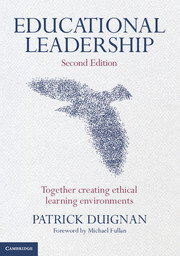Book contents
- Frontmatter
- Foreword
- Contents
- Acknowledgements
- INTRODUCTION AND OVERVIEW
- CHAPTER 1 THE CHANGING AND CHALLENGING CONTEXT FOR EDUCATIONAL LEADERS
- CHAPTER 2 KEY MACRO CHALLENGES FOR EDUCATIONAL LEADERS
- CHAPTER 3 KEY MICRO CHALLENGES FOR EDUCATIONAL LEADERS
- CHAPTER 4 LEADERSHIP CHALLENGES AS TENSIONS
- CHAPTER 5 A FRAMEWORK FOR ANALYSING ETHICAL TENSIONS
- CHAPTER 6 VISION-INSPIRED LEADERSHIP AND ETHICAL DECISION-MAKING
- CHAPTER 7 BUILDING A COLLECTIVE ETHIC OF RESPONSIBILITY FOR LEADERSHIP IN SCHOOLS
- CHAPTER 8 AUTHENTIC LEADERS USE THE POWER OF PRESENCE, AUTHENTIC RELATIONSHIPS, AND INFLUENCE FIELDS
- CHAPTER 9 AUTHENTIC LEADERS HELP CREATE INNOVATING, DEEP, RICH LEARNING ENVIRONMENTS
- CHAPTER 10 FORMING CAPABLE AND AUTHENTIC LEADERS: TRANSFORMATIONAL LEARNING APPROACHES
- References
- Index
CHAPTER 1 - THE CHANGING AND CHALLENGING CONTEXT FOR EDUCATIONAL LEADERS
Published online by Cambridge University Press: 05 June 2012
- Frontmatter
- Foreword
- Contents
- Acknowledgements
- INTRODUCTION AND OVERVIEW
- CHAPTER 1 THE CHANGING AND CHALLENGING CONTEXT FOR EDUCATIONAL LEADERS
- CHAPTER 2 KEY MACRO CHALLENGES FOR EDUCATIONAL LEADERS
- CHAPTER 3 KEY MICRO CHALLENGES FOR EDUCATIONAL LEADERS
- CHAPTER 4 LEADERSHIP CHALLENGES AS TENSIONS
- CHAPTER 5 A FRAMEWORK FOR ANALYSING ETHICAL TENSIONS
- CHAPTER 6 VISION-INSPIRED LEADERSHIP AND ETHICAL DECISION-MAKING
- CHAPTER 7 BUILDING A COLLECTIVE ETHIC OF RESPONSIBILITY FOR LEADERSHIP IN SCHOOLS
- CHAPTER 8 AUTHENTIC LEADERS USE THE POWER OF PRESENCE, AUTHENTIC RELATIONSHIPS, AND INFLUENCE FIELDS
- CHAPTER 9 AUTHENTIC LEADERS HELP CREATE INNOVATING, DEEP, RICH LEARNING ENVIRONMENTS
- CHAPTER 10 FORMING CAPABLE AND AUTHENTIC LEADERS: TRANSFORMATIONAL LEARNING APPROACHES
- References
- Index
Summary
Educational leaders are subjected to external and internal pressures, challenges and expectations that make demands on their time, expertise, energies and emotional wellbeing. Increasingly, they are being held accountable for their own performance and for that of the teachers and students under their care. They are also expected to comply with the highest ethical and moral standards in their relationships and practices.
While some leaders may experience confusion, even frustration, in attempting to respond productively to these challenges, other school members, especially teachers, may feel devalued by the considerable criticism of schools and schooling in the media. The current emphasis on corporate management values, strategies and practices in many educational organisations may seem like an assault on their professionalism.
This book is written within a leadership context that is increasingly sensitive to the need for sound ethical and moral standards in how organisations are led and decisions made. As stated in the introduction, there is greater scrutiny of the behavioural ethics of all our leaders, including those in schools. As many ethical breaches have been exposed in other organisations, the time is now opportune for educational leaders to ensure that they are reviewing and embedding high ethical and moral standards in their policies and practices.
Increasingly educational leaders live and work in a global world that, according to Giddens (1998), influences social processes and institutions and encourages new forms of individualism that contribute to more selfish modes of living.
- Type
- Chapter
- Information
- Educational LeadershipTogether Creating Ethical Learning Environments, pp. 5 - 15Publisher: Cambridge University PressPrint publication year: 2012



